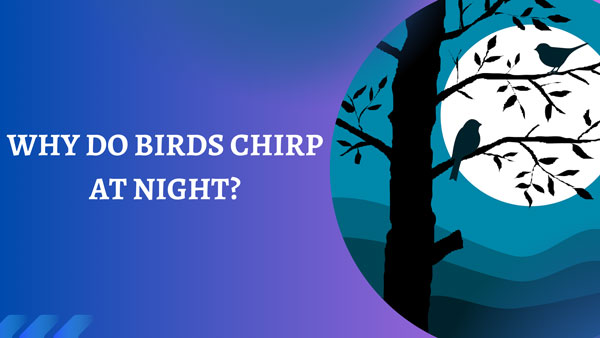If you’ve ever laid awake at night, serenaded by the sweet sounds of birds chirping in the darkness, you may have pondered why these creatures are so active and noisy at night.

Birds are typically identified by their daytime songs and cries, but the phenomena of birds chirping at night are as remarkable. We shall investigate the causes behind this behavior and shed light on the interesting realm of nighttime serenades in this post. So let’s understand why do birds chirp at night.
Why Do Birds Chirp at Night?
Birds sing late at night for a variety of reasons. Some bird species are natively nocturnal or crepuscular, which means they are active at dusk or throughout the night. Nighttime is critical for these birds’ social activities, mating displays, and territorial defense.
Vocalizations are used for communication, allowing them to remain in touch with their flock or discover possible partners. Furthermore, environmental conditions, hormonal shifts, and less competition during the quieter night hours may all lead to greater nocturnal singing in some bird species.
Communication that is Natural
One of the most common reasons does birds chirp at night, is to communicate. While many birds are diurnal, or active throughout the day, some are crepuscular or nocturnal. Nighttime is critical for these birds’ social interactions and keeping in touch with their partners, flock members, or other individuals in their region.
Vocalizations are important in creating and sustaining social relationships, and chirping at night helps to keep the group together even in the dark. It is the most important reason for why do birds chirp at night.
Getting Mates
For several bird species, the night is an important period for courting displays and enticing possible mates. The cover of night protects certain birds from predators as they perform intricate songs and cries to demonstrate their vitality and genetic fitness.
During the mating season, nocturnal choruses can be very vigorous as males compete to get the attention of females.
Territorial Protection
Birds are known to protect their territory against intruders, and does birds chirp at night can be used to do so. They announce their presence and warn possible intruders to keep away by vocalizing at night.
This behavior is particularly noticeable in species with overlapping territories or when migratory birds pass through a new region during their nightly migrations.
Triggers in the Environment
Environmental factors can also contribute to birds chirping at night. Certain meteorological conditions, like as warm, humid evenings, may, for example, induce increased vocalization in particular species.
Furthermore, artificial illumination might lead certain birds’ behavior to change and become more active at night. Because of their adaption to urban contexts, their vocalizations may change in timing.
Orientation and Navigation
Birds use a variety of cues to navigate their migratory routes or even inside their local areas. So do birds chirping at night While they predominantly employ visual clues during the day, vocalizations can operate as acoustic beacons at night, allowing them to keep in contact with their group or make their way back to regular roosting locations.
Reduced Competition
In some situations, particularly densely populated areas with a lot of daytime noise, birds may find it less competitive to sing at night. By performing at night, they minimize the cacophony of everyday sounds and improve the likelihood that their songs will be heard by possible partners or members of their social circle.
Hormonal Elements
Hormone changes in birds can impact their singing behavior, and do birds chirping at night, these fluctuations can be regulated by the time of day. Some species’ hormonal activity increases during the night, resulting in greater singing behavior during those hours. Always consider this in why do birds chirp at night.
Is it a bad thing when birds chirping at night?
So, why do birds chirp at night? the bird symphony at night! It’s similar to an unplanned outdoor performance but with no tickets necessary and a diverse range of musicians. You’re resting in bed, trying to get some shut-eye when you hear it: the chirping chorus. It’s as if the birds have chosen to create an acapella ensemble and have a lot to say.
You can almost imagine them discussing the latest bird gossip or evaluating one other’s singing abilities. “Hey, Terry, your ‘whip-poor-will’ needs some zing!” Then there’s the bird who thinks of itself as a jazz vocalist, improvising its song like a freestyle master. You can’t help but smile as you wonder whether they’re auditioning for a reality program.
Some species of birds chirp at night as a normal activity, although their perception as “bad” depends on context. While midnight singing is a typical aspect of their communication and mating behaviors, it may be disturbing to human sleep in metropolitan areas with significant bird populations. Increased nighttime activity due to artificial lights may also suggest environmental problems.
Conservation problems may occur if the behavior is driven by stress or habitat changes, reducing bird populations’ well-being and reproductive success. Striking a balance between retaining natural behaviors and mitigating possible disturbances is critical for bird-human cooperation.
Conclusion
The nighttime chirping of birds is an enthralling feature of avian life, rooted in the need for communication, mating, and territorial defense. While some bird species are nocturnal or crepuscular by nature, others may vary their behavior to adapt to environmental changes like urbanization.
These nocturnal serenades add to the enchantment of the natural world and remind us of our feathery companions’ various and amazing activities. Take a minute to appreciate the secret world of nocturnal communication and the complicated lives of these fascinating creatures the next time you hear the beautiful songs of birds in the dark. Now you know why do birds chirp at night.
Also Read: